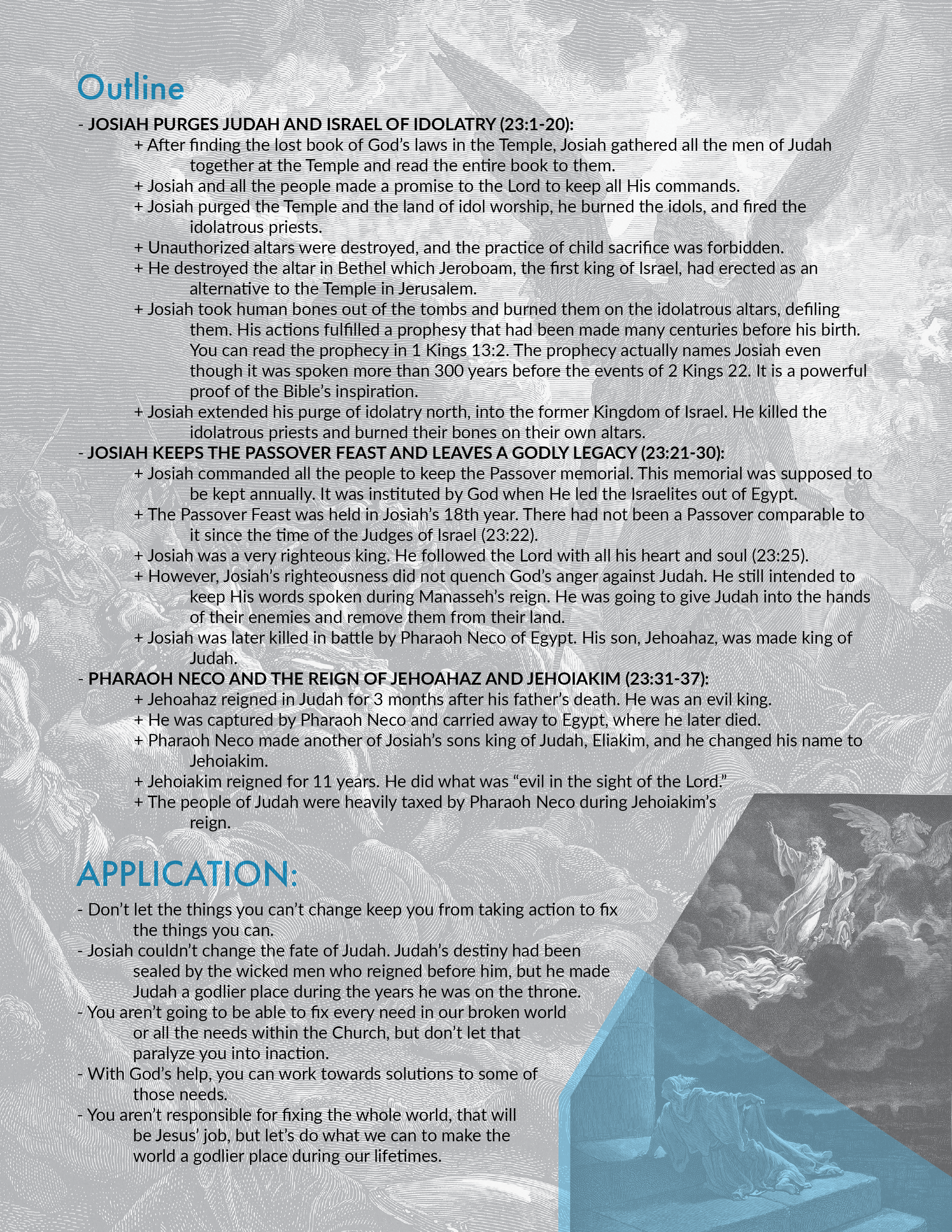2 Kings 23 Summary - 5 Minute Bible Study
2 Kings 23 Short Summary:
2 Kings 23 documents King Josiah’s reforms in Judah and the former Kingdom of Israel. Josiah purged the land of all idolatry and destroyed the high places where people offered unauthorized sacrifices. He commanded all the people to keep the Passover Feast, which had been neglected during the time of the kings. The rest of the chapter records the reigns of Jehoahaz and Jehoiakim, and how they were oppressed by Pharaoh Neco of Egypt.
2 Kings 23 Extended Summary
WHEN:
The reign of King Josiah, Jehoahaz, and Jehoiakim in Judah spanned from approximately 640-597 B.C.
CHARACTERS:
Josiah – The son of Amon. He became king of Judah after Amon his father. He became king at just 8 years old. He was a righteous king who respected God and restored the law of God in Judah.
Pharaoh Neco – The king of Egypt. He killed Josiah and oppressed Judah.
Jehoahaz – Josiah’s son who reigned over Judah for a very short period. He was captured and taken prisoner to Egypt.
Eliakim (Jehoiakim) – Josiah’s son who was put on the throne by Pharaoh Neco.
WHERE:
Jerusalem is the key location of 2 Kings 23.
Josiah was killed at Megiddo.
OUTLINE:
JOSIAH PURGES JUDAH AND ISRAEL OF IDOLATRY (23:1-20):
After finding the lost book of God’s laws in the Temple, Josiah gathered all the men of Judah together at the Temple and read the entire book to them.
Josiah and all the people made a promise to the Lord to keep all His commands.
Josiah purged the Temple and the land of idol worship, he burned the idols, and fired the idolatrous priests.
Unauthorized altars were destroyed, and the practice of child sacrifice was forbidden.
He destroyed the altar in Bethel which Jeroboam, the first king of Israel, had erected as an alternative to the Temple in Jerusalem.
Josiah took human bones out of the tombs and burned them on the idolatrous altars, defiling them. His actions fulfilled a prophesy that had been made many centuries before his birth. You can read the prophecy in 1 Kings 13:2. The prophecy actually names Josiah even though it was spoken more than 300 years before the events of 2 Kings 22. It is a powerful proof of the Bible’s inspiration.
Josiah extended his purge of idolatry north, into the former kingdom of Israel. He killed the idolatrous priests and burned their bones on their own altars.
JOSIAH KEEPS THE PASSOVER FEAST AND LEAVES A GODLY LEGACY (23:21-30):
Josiah commanded all the people to keep the Passover memorial. This memorial was supposed to be kept annually. It was instituted by God when He led the Israelites out of Egypt.
The Passover Feast was held in Josiah’s 18th year. There had not been a Passover comparable to it since the time of the Judges of Israel (23:22).
Josiah was a very righteous king. He followed the Lord with all his heart and soul (23:25).
However, Josiah’s righteousness did not quench God’s anger against Judah. He still intended to keep His words spoken during Manasseh’s reign. He was going to give Judah into the hands of their enemies and remove them from their land.
Josiah was later killed in battle by Pharaoh Neco of Egypt. His son Jehoahaz was made king of Judah.
PHARAOH NECO AND THE REIGN OF JEHOAHAZ AND JEHOIAKIM (23:31-37):
Jehoahaz reigned in Judah for 3 months after his father’s death. He was an evil king.
He was captured by Pharaoh Neco and carried away to Egypt, where he later died.
Pharaoh Neco made another of Josiah’s sons king of Judah, Eliakim, and he changed his name to Jehoiakim.
Jehoiakim reigned for 11 years. He did what was “evil in the sight of the Lord.”
The people of Judah were heavily taxed by Pharaoh Neco during Jehoiakim’s reign.
APPLICATION:
Don’t let the things you can’t change keep you from taking action to fix the things you can.
Josiah couldn’t change the fate of Judah. Judah’s destiny had been sealed by the wicked men who reigned before him, but he made Judah a godlier place during the years he was on the throne.
You aren’t going to be able to fix every need in our broken world or all the needs within the Church, but don’t let that paralyze you into inaction.
With God’s help, you can work towards solutions to some of those needs.
You aren’t responsible for fixing the whole world, that will be Jesus’ job, but let’s do what we can to make the world a godlier place during our lifetimes.


